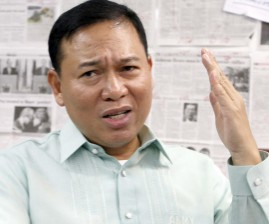Retired Maj. Gen. Jovito Palparan, infamously tagged as “berdugo” (butcher) by militant activists, is the last of his kind in the military, so says Lt. Gen. Emmanuel Bautista, the chief of the Philippine Army.
Bautista said the Armed Forces of the Philippines had been strictly monitoring the performance of its officers and enlisted personnel regarding the military’s program to instill respect for human rights among soldiers on the battlefield.
In a recent interview with Philippine Daily Inquirer reporters and editors, Bautista said the AFP had been “seriously” addressing allegations of human rights violations against the military by prosecuting erring officers.
“Is there someone like him in the Army? Not any more. Even you can answer that,” Bautista replied when asked if the likes of Palparan still existed in the AFP. “I think even you can say that the military’s human rights record now is much improved as compared to the previous years.”
As for suggestions that the military is helping the fugitive Palparan, Bautista said: “I can tell you I’m not coddling Palparan.”
Asked where the dreaded former Army general could be hiding, he simply replied: “Your guess is as good as mine.”
The Army has no authority to hold Palparan for his supposed transgressions, Bautista said, pointing out that Palparan had left the service and is now regarded as a civilian.
Accused of masterminding several cases of extrajudicial killings and enforced disappearances involving left-leaning activists, Palparan went into hiding early this year after the Bulacan Regional Trial Court ordered his arrest for his alleged role in the case of two missing University of the Philippines students in 2006.
The retired Army general, described as the face of the Arroyo administration’s counterinsurgency program, has failed to stop the courts from pursuing his arrest.
Palparan, who won praises from then President and now Pampanga Rep. Gloria Macapagal-Arroyo, was also implicated in the grisly killings of human rights leader Eden Marcellana and Eddie Gumanoy in 2004 in Mindoro Oriental.
Respect for human rights
Bautista, widely touted as the likely successor of Gen. Jessie Dellosa when the AFP chief of staff retires next January, said the military had incorporated a module on international humanitarian law (IHL) and respect for human rights in the training of AFP recruits.
Col. Roderick Parayno, chief of the Army’s Human Rights Office, said AFP personnel from the brigade level down to the company level were undergoing regular workshops and seminars on human rights issues.
He said even senior military officers and ordinary paramilitary members were compelled to attend courses on human rights education.
Said Parayno: “Our efforts in advocating human rights is continuous. For the longest time, we have been regularly teaching our regulars and enlisted personnel about IHL and other related subjects on human rights.”
He said the AFP had also instituted the setting up of human rights offices in all levels in the military organization.
2 imperatives
“Give it some more time, I think our efforts to educate our personnel would be absorbed by the whole organization and eventually, there will no more human rights violations committed by the military,” Parayno said.
According to Bautista, respect for human rights was one of the two “imperatives” of the military’s new counterinsurgency campaign IPSP (Internal Peace and Security Plan) Bayanihan.
“More than education and training, abiding by human rights is part of our strategy. Adhering to human rights and rule of law, and involving our stakeholders are our two imperatives. They are our ‘must dos,’” the Army chief said. “It’s not a constraint to our strategy. It is an essential element of our strategy.”
While there were still accusations of human rights violations against the military, such as the recent killing of the wife of an antimining B’laan tribe leader and her children, Bautista said the AFP “remains open and is ready to throw the book” on those involved in military abuses.
“That’s the difference. Now, we are going after those who committed violations. Cases of human rights abuses are not tolerated,” Bautista said.
The transformation of the Army is an “ongoing concern,” he said, adding that it starts with the realization that “we want to redeem our tarnished reputation.”
“We want to be a better Army. Not that we are a bad Army, but we want to be better,” he said.
Militants’ charges
But the reality outside the military camps is far from the rosy picture that Bautista paints, according to the human rights group Karapatan.
Cristina Palabay, Karapatan secretary general, said at least 114 activists had fallen victims to extrajudicial killings under the Aquino administration while close to 30,000 people had been displaced by “militarization” in the provinces.
She said at least 12 individuals were abducted by suspected military agents recently and 127 were illegally arrested.
“The legacy of Jovito Palparan is well and alive under the current leadership of the AFP. Extrajudicial killings continue and are committed with impunity as a result of militarization,” Palabay said over the phone.
“Schools, town plazas and other public areas are being occupied by the military to sow terror among residents in the guise of its Oplan Bayanihan,” she lamented.
For Renato Reyes, secretary general of Bagong Alyansang Makabayan, Bautista’s statements were mere “empty claims.”
“Aside from the massacre of the [wife of the] tribe leader and her family in Davao, the military arrested a supposed top leader of the NPA (New People’s Army) in Southern Tagalog who turns out to be just an ordinary security guard,” Reyes said.
“All these violations continue. The denials of the AFP are worthless at this point since there’s still no accountability among those involved in human rights violations, especially those in the higher echelons.” With a report from Nikko Dizon
